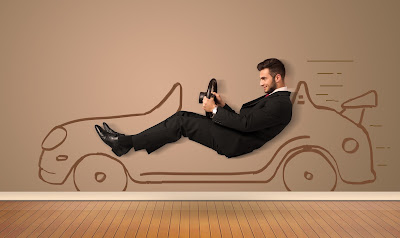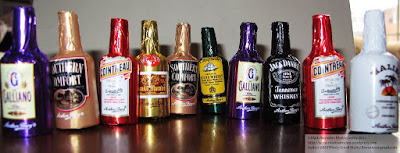 |
| Drink driving offence aren't child's play |
As a solicitor specialising in drink driving offences I
generally encounter three types of potential client. The first want to get off at all costs, often
it’s because the fact of a conviction will ruin their lives whether it’s
because it messes up their overseas travel/work or because they will lose their
job here in the UK. The second type isn’t
too bothered about the conviction but wants to keep their driving licence
despite it – again this often motivated by a desire not to lose one’s employment. The third type are, in some ways, the more
interesting; they are the people who want to plead guilty.
I’m often asked by people in the third category, “if I’m
going to be banned from driving anyway, what can a solicitor do for me?”
 |
Some "advisers" make me wonder if
you're not better asking the court
cat for legal advice and representation |
I understand why people aren’t sure – in fact in a recent
Twitter conversation with a fellow solicitor I was told that he (or she, I know
not which) attends court in drink driving cases but rarely has much impact on
the outcome of the case. I was surprised
to hear that because there is a lot a solicitor can, and should, be able to do
for somebody who is pleading guilty.
Before court
For me, the case begins before we get near the courtroom. While I cannot give definitive advice until I
have seen the prosecution evidence, I can give fairly precise advice based upon
your instructions. I can begin to
identify the potential mitigating factors that will help reduce your
sentence. I can also talk you through
the court process and what to expect – something I find worries a lot of
people.
A first time offender who is normally a responsible
person can help herself a lot by obtaining character references. These won’t make a massive difference by themselves,
but they will form part of the mitigation that helps convince the court that
this incident is out of the ordinary for you.
At court
Before the hearing
By the time we get to the morning of a first appearance
in court, I would hope to have met my client a week or so earlier and to have discussed
the options with him. On the morning, I
will go through the prosecution evidence looking for errors, omissions or facts
that do not add up. I will also be
looking for evidence that can be excluded.
The point being that before you enter your guilty plea you really
understand the case you are facing and whether there is any defence whatsoever. It’s also important to remember that
sometimes the prosecution evidence can be used to help your mitigation and
finding those helpful points is a key service your solicitor will provide.
Ensuring that every client has the best advice on their
prospects of winning a trial is a very important part of the defence solicitor’s
job. Our justice system is adversarial,
meaning that the prosecution must prove the case against the defendant – if they
cannot then the defendant is not guilty.
Some people do not like that fact, but it’s been our justice system for
better part of 1,000 years, so if you don’t like it then I suggest you petition
your MP to change it.
It is sometimes claimed that the court’s legal advisor or
the duty solicitor will help unrepresented defendants – don’t count on it. A duty solicitor is only there to help
defendants facing a prison sentence and will not get involved in most drink
driving cases. So far as legal advisors
are concerned, let me put it this way: I witnessed a defendant in court today
accused of ignoring a prohibition notice plead guilty then put forward
mitigation that was clearly a defence.
The legal advisor simply ignored this contradiction and allowed the
bench to sentence him (and seize his motorcar into the bargain). Not really the sort of help you want.
At this stage, some people change their minds and decide
to plead not guilty. In a recent case, I
represented a client who had planned to plead guilty; however, at court it was
clear that the prosecution could not prove that my client had been driving at
the time a collision took place. The
prosecution had three-months to consider their position and at trial their
still could not prove my client was guilty so he was acquitted. Again, if you’re one of the people who don’t
like how our justice system works then don’t tell me; tell your MP.
During the hearing
Assuming that after we have discussed your case you are
still intending to plead guilty we will head into court for the hearing. By now, I will have a very good idea of what
happened to bring you to court and why it happened. I will be able to highlight all the mitigating
factors and deal with any aggravating factors.
After the prosecution have set out their case to the magistrates,
I will set about mitigating on your behalf.
Mitigation has two very broad headings, first is mitigation relating to
the offence – such as why your actions are not as serious as the prosecution
say they are. The second is personal
mitigation, one of the aims of which is to engender some sympathy for you from
the court – so it may focus on our family, your work, both or something
entirely different. I am a great
believer in knowing your audience so I do my best to watch the magistrates
before my case is called on to get a feel for what sort of arguments are likely
to work and, which are doomed to failure.
 |
Knowing the complexities of drink driving law is essential
(Sadly I was told I wasn't good looking enough for this photo) |
Depending on the circumstances, I will often include a
discussion on the law as part of my mitigation speech. A common example, is in asking the court to
reduce the length of the driving disqualification. Most solicitors say that the length of the
ban cannot be reduced; however, I take the view that the law does allow a
reduction and I get my way more often than not (in fact only two courts have
ever refused to allow the reduction after I have set out my grounds for it).
Many articulate defendants can successfully put their own
case to the magistrates without a solicitor and I have been instructed simply
to advise on how defendants should structure their mitigation speech in the
past. However, one thing most defendants
will struggle to do is spot when the judge is exceeding his or her
authority. In March, I dealt with two
cases within a week of one another where the District Judge in one case and the
magistrates in the other imposed a sentence wholly incompatible with the
sentencing guidelines. Obviously, I was
able to spot the errors quickly, address the bench and cite the appropriate law
so as to convince the court that it was exceeding its powers.
After the hearing
It is very important that you understand exactly what has
happened in the court room because it can have a big impact on you in
future. So, after the hearing I will always
discuss the case with my clients after the hearing to make sure they understood
what was said by the court and what that means for them.
What impact can your solicitor have on the outcome?
Instructing the right solicitor who understands the very
specialised law surrounding drink driving offences can have a big impact on the
outcome of your case.
We’ll briefly look at a couple of recent cases to see
what impact a solicitor can have on your case.
In the first, the defendant had no previous convictions, was a family
man and a business man who had been out with friends and thought he was being
sensible by only drinking two glasses of wine when his friends consumed far
more. It was clear from speaking to him
that he did not think anything to do with his personal life was relevant and so
would not have told the court about it had he been unrepresented. In fact, I took the court through the
circumstances of the offence, explained to them about his family life and his
business. I was able to build an honest
picture of a responsible man who had made a mistake and who was genuinely
remorseful for his actions. The court
indicated that the correct starting point was a fine totalling 150% of his
weekly income and a 16-month driving ban.
After hearing the mitigation they reduce the fine to 50% of weekly
income and a 12-month ban. They further
reduced the ban to 9-months upon completion of the drink driving rehabilitation
course.
 |
Good advice from an expert drink driving solicitor can mean
that you are holding your very own driving licence much sooner
than if you go it alone or with a non-expert lawyer |
In the second case, the defendant had been caught drink
driving following an accident and had provided a specimen of breath that showed
a very high reading, which meant that the court must consider imposing a
community order – that will usually involve unpaid work and a curfew with
electronic tagging device. Because there
were some previous conviction, albeit unrelated to drink driving, we were not
going to be able to argue that this person was normally a responsible
individual. Instead I conducted the
sentencing hearing myself and attacked the aggravating features where
possible. I relied upon a great deal of
case law and argued that a community order with a curfew would prevent this
person from continuing in his current job.
The court indicated that the correct starting point was a community
order with unpaid work and an electronically monitored curfew. After much persuading the court agreed that
the defendant should be fined for this offence rather than receiving unpaid work
and a curfew.
So, in conclusion: what can a solicitor do for somebody
pleading guilty?
1. Reduce
the sentence you receive at the end of the case;
2. Help
settle your nerves about the hearing;
3. Ensure
your case is fully prepared for every eventuality;
4. Give
you expert advice on the evidence against you;
a. Whether
there is a defence;
b. Whether
the evidence can help mitigate for you
5. Give
you expert advice on the law to get you the best result possible;
6. Provide
convincing and persuasive advocacy on your behalf; and
7. Rectify
any mistakes by the court before they cause you a problem.















